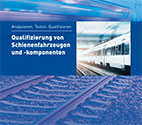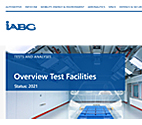Impact testing
Fields of application
- Trains are exposed to high mechanical stresses such as hail, stone impact or vandalism.
- These influences can lead to massive damage to materials and components of the train.
- Impact tests with standardised projectiles reveal structural weak points of components such as e.g. windscreens, train fronts, side doors.
- Impact tests offer the possibility to detect structural problems of components in advance and provide valuable insights for product optimisation.
Services
- Impact tests according to international standards, e. g. IC 651, DIN EN 15152 and DIN EN 5566, NF F 15-818, GM / RT 2100 Appendix B or customer-specific
specifications - Investigation of failure mode by different types of test projectiles (metal projectiles, stone, gelatine, ice, etc.)
- Evaluation of deformation and strain
- Data acquisition with e. g. strain gauges, accelerometers, load cells
- Non-destructive testing methods, e. g. ultrasonic and eddy current, CT
Technical data • Capacity
- Realisable speeds of over 350 m/s
- Mass over 10 kg (depending on speed)
- Calibre up to 350 mm
- Almost any projectile geometry (symmetrical / asymmetrical)
- Specific adjustment of the flight attitude of the projectile
- High-speed acquisition of relevant parameters including digital image correlation
- Data acquisition with a sampling rate up to 1 MHz
- 172 hectare fenced area with excellent protection and security measures – both in the conduct of experiments and in secrecy
- VDA ISA TISAX zertifiziert für die Labels „Informationen mit sehr hohem Schutzbedarf“, „Prototypenschutz“ und „Datenschutz“ für die Standorte Ottobrunn und Lichtenau
- ISO 14001
- ISO 9001
- DIN EN ISO/IEC 17025 for Fatigue Strength Laboratory
- DIN EN ISO/IEC 17025 für das Betriebsfestigkeitslabor - Verzeichnis der Prüfverfahren
- 16.02.2024IABG-Gruppe veräußert EXTEDO GmbH an Bertelsmann Investments
- 21.11.2023IABG successfully certified according to ISO 27001
- 24.10.2023Vorbereitungslehrgang der IABG-Werkfeuerwehr zur Brandschutzfachkraft (IHK)
- 25.09.2023IABG und dSPACE kooperieren: Power HIL-Prüfstände und Testzentren branchenspezifisch und schlüsselfertig aus einer Hand

